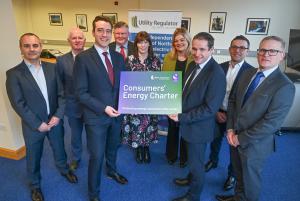
The Utility Regulator, the Consumer Council, the Department for Communities, Department for the Economy, and the gas and electricity suppliers have come together to provide households with extra support measures this winter.
Electricity and gas suppliers in Northern Ireland have voluntarily supported a new energy charter, whose development has been led by the Utility Regulator and the Consumer Council for Northern Ireland.
In signing up to this Charter, electricity and gas suppliers have agreed to:
- contribute to a hardship fund for households struggling with their bills;
- reduce the maximum debt repayment rate amount to 20%;
- ensure customers on their care registers will not be moved onto pre-payment meters, unless it is requested;
- guarantee that households will not be moved onto a pre-payment meter over the Christmas period, unless they request it;
- make sure that customers on their care registers are aware of the best tariff available; and
- all consumers will be able to avail of a single website offering clear, up-to-date information on energy efficiency and other matters.
Commenting on the launch of the charter, John French, Chief Executive of the Utility Regulator, said:
“Consumers have told us how much they are struggling with their electricity and gas bills, and this will become a greater challenge as we move further into the winter. As a regulator, we are determined to do everything we can, and take the necessary steps, to protect all consumers.
“In addition to the financial package of energy schemes being rolled out by the UK government, the energy charter is a series of measures which together will provide practical and tangible support to vulnerable consumers this winter.
“Along with the Consumer Council, we have been working on developing the energy charter for some time and are grateful for the co-operation of local energy suppliers, as well as colleagues in the Departments for the Economy and Communities, to help us finalise the charter. We believe that the package of measures in the charter will make a tangible difference to those consumers that are struggling this winter. We will ensure that the commitments set out in the energy charter are delivered.”
Peter McClenaghan, Consumer Council Director of Infrastructure and Sustainability, said:
“Times are tough for consumers, particularly in relation to energy prices. Even with the financial support announced by Government, most households will pay higher prices this winter than last winter. In March 2022 we found 1 in 3 households were in fuel poverty. Sadly, we expect even more households to struggle in the coming months.
As consumers are paying very high prices for energy, and many of us are really struggling as a result, the Consumer Council welcome the voluntary agreement of local suppliers to put in place this extra support this winter.
We will support suppliers to ensure these tangible, beneficial, and measurable commitments to their customers are delivered and will continue to work closely with the Utility Regulator to enhance consumer protection.”
ENDS
For further information, please contact Greg Irwin 07794 965911.
Notes to editor
- The Utility Regulator is the independent non-ministerial government department responsible for regulating the electricity and gas industries and water and sewerage services in Northern Ireland.
- The list of suppliers involved in the Charter are: Budget Energy, Click Energy, Electric Ireland, firmus energy, Power NI, SSE Airtricity
- The Charter can be accessed on this link, along with an associated FAQ document
- The Consumer Council has published information on how suppliers are helping energy consumers this winter – see www.consumercouncil.org.uk/consumers/rights-and-advice/energy/consumer-energy-charter
- Picture shows John French of the Utility Regulator and Peter McClenaghan of the Consumer Council along with representatives from Budget Energy, Click Energy, Electric Ireland, firmus energy, Power NI and SSE Airtricity at the launch of the Consumer Energy Charter